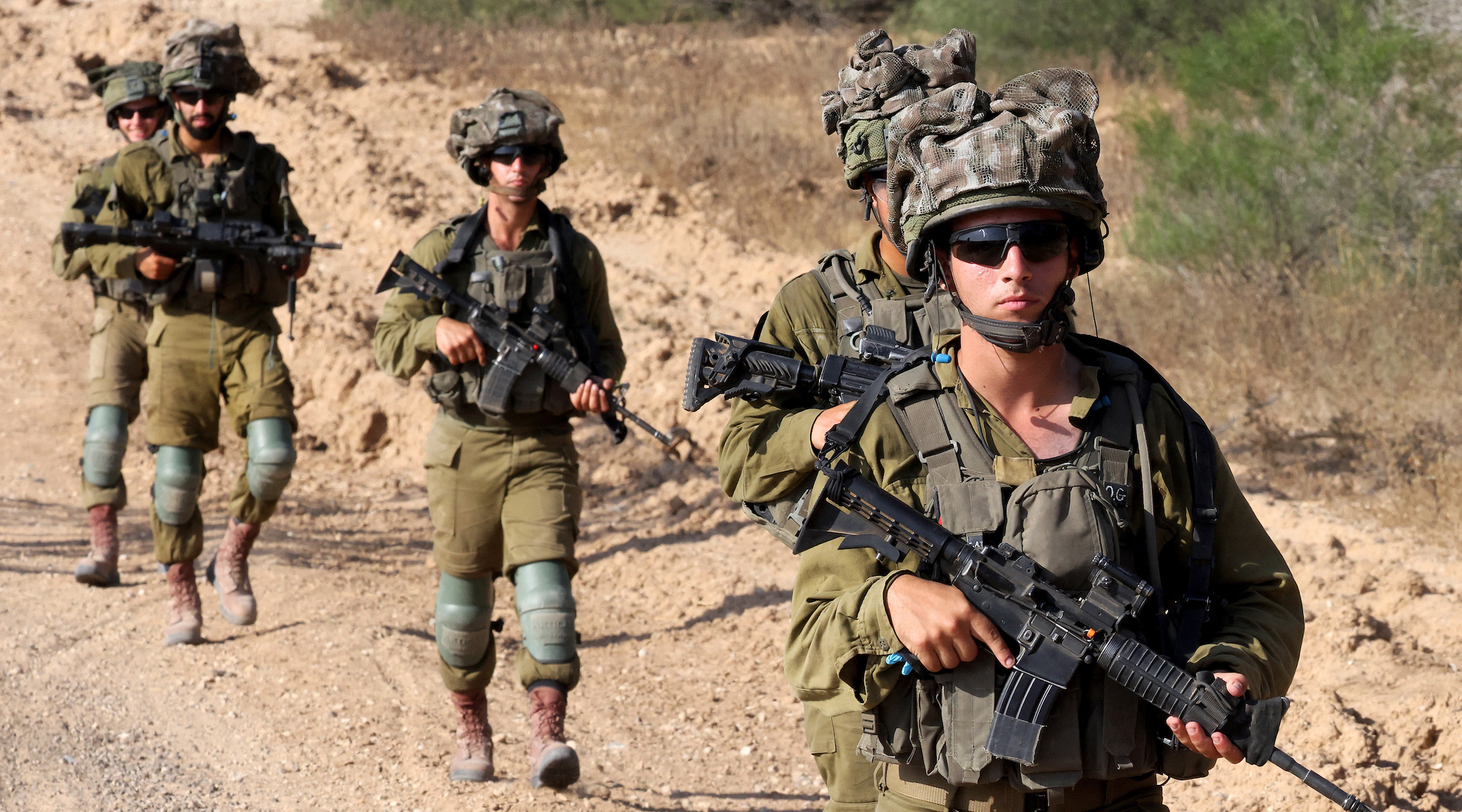10 Israeli soldiers killed in separate incidents in Gaza in deadliest day for military since January
The incidents came on the first day of a humanitarian pause Israel announced that will stop fighting along a key southern Gaza road every day to enable the delivery of aid

Israeli soldiers patrol around a position along Israel’s southern border with the Gaza Strip on June 13, 2024. (Jack Guez / AFP)
Ten Israeli soldiers were killed in Gaza on Saturday in one of the bloodiest days for the Israeli military since the beginning of its war with Hamas.
An additional soldier died of wounds sustained in battle earlier in the week.
The casualties came as Israel is negotiating with Hamas over a potential ceasefire that would see the release of hostages held by the terror group. Israel reportedly expects Hamas to reject the ceasefire offer, made with U.S. support. The incidents also came on the first day of a pause Israel announced that will stop fighting along a key southern Gaza road every day from morning to evening to enable the delivery of humanitarian aid.
Following the deaths, Israeli Prime Minister Benjamin Netanyahu vowed to continue fighting the war in the face of international pressure. He called the casualties “heart-rending.”
“Despite the heavy and unsettling price, we must cling to the goals of the war: The destruction of Hamas’s military and governing capabilities, the return of all of our hostages, making certain that Gaza will never again constitute a threat to Israel and the return of our residents securely to their homes in both the north and the south,” he said.
Eight of the 10 casualties occurred in Rafah, the city in southern Gaza where Israel is battling what it says are Hamas’ remaining organized forces. An explosive hit an Israeli armored personnel carrier, killing all of the soldiers inside. Israeli media reported that the explosive was either placed on the vehicle, or came from an antitank missile.
Two more casualties came in a tank explosion in northern Gaza, where Israel has been fighting vestiges of Hamas’ forces for months after focusing its firepower there earlier in the war. The soldiers killed on Saturday range in age from 19 to 49.
In total, Israel says more than 300 of its soldiers have been killed in the invasion of Gaza after Hamas killed 1,200 people and took some 250 hostage in its Oct. 7 invasion of Israel. More than 37,000 people have since been killed in Gaza, according to the Hamas-run Gaza health ministry. Israel says more than a third of that number are combatants.
Israel has faced mounting international pressure over the mounting civilian death toll in Gaza and the humanitarian crisis spurred by the war. On Sunday, the arm of the Israel Defense Forces that coordinates humanitarian aid announced “a local, tactical pause of military activity for humanitarian purposes” from 8 a.m. to 7 p.m. every day along a central road in southern Gaza.
The military has faced accusations of not doing enough to facilitate aid, and the office, called COGAT, said the decision was “an additional step in the humanitarian aid efforts that have been conducted by the IDF and COGAT since the beginning of the war.”
But it is unclear how long the daily pause will last. Netanyahu claimed that he was unaware of the decision and his office called it “unacceptable.” According to Haaretz, Netanyahu’s office said “that there has been no change in the IDF’s policy and that the fighting in Rafah would continue as planned.”
This article originally appeared on JTA.org.
A message from our Publisher & CEO Rachel Fishman Feddersen

I hope you appreciated this article. Before you go, I’d like to ask you to please support the Forward’s award-winning, nonprofit journalism so that we can be prepared for whatever news 2025 brings.
At a time when other newsrooms are closing or cutting back, the Forward has removed its paywall and invested additional resources to report on the ground from Israel and around the U.S. on the impact of the war, rising antisemitism and polarized discourse.
Readers like you make it all possible. Support our work by becoming a Forward Member and connect with our journalism and your community.
— Rachel Fishman Feddersen, Publisher and CEO

























